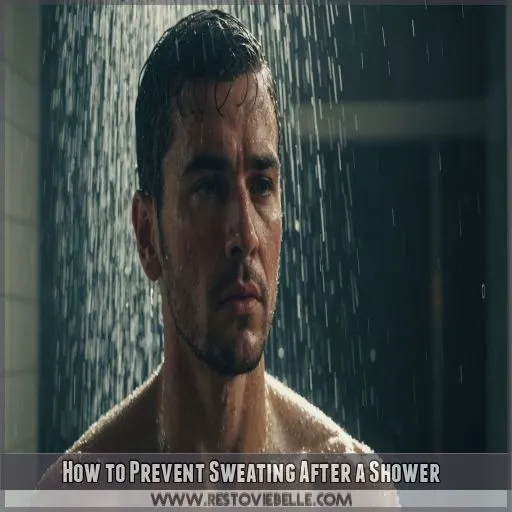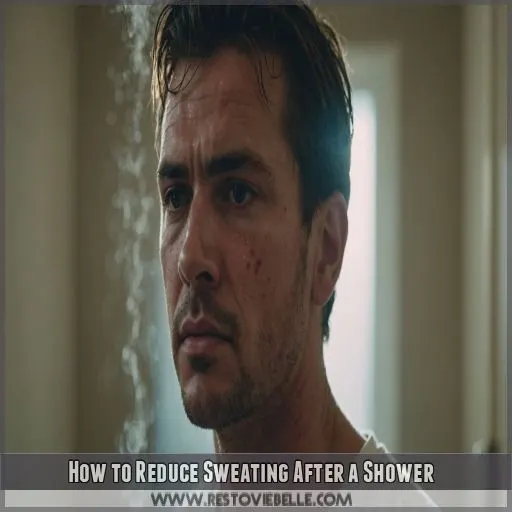This site is supported by our readers. We may earn a commission, at no cost to you, if you purchase through links.

It’s not just because your bathroom feels like a sauna. When you take a hot shower, your body temperature rises, and the warm vapors from the water make the air feel like a humid jungle.
As your body tries to cool down, you start sweating. Add some towel friction and skin irritation to the mix, and you’ve got a recipe for a sweaty mess.
But don’t worry, we’ve got some tips to help you stay cool and dry – starting with a simple trick to lower your body temperature.
Table Of Contents
- Key Takeaways
- Reasons for Sweating After a Shower
- How to Prevent Sweating After a Shower
- Common Mistakes to Avoid
- Managing Sweat After a Shower
- Is It Normal to Sweat After a Shower?
- How to Reduce Sweating After a Shower
- Addressing Concerns About Sweating After a Shower
- When to Seek Medical Attention for Sweating
- Frequently Asked Questions (FAQs)
- Why do I sweat so much after a shower?
- Why do I sweat after taking a cold shower?
- Why am I sticky after a shower?
- Will I be less sweaty if I lose weight?
- Can sweating after a shower be a sign of stress?
- Does sweating after a shower affect people of all ages?
- Is it possible to experience sweating after a cold shower?
- Can certain medications cause excessive sweating after a shower?
- Does sweating after a shower impact people with dry skin?
- Conclusion
Key Takeaways
- You sweat after a shower because your body temperature rises, the bathroom is extremely humid, and towel friction irritates your skin – it’s like a perfect storm of sweat. To combat this, try lowering the water temperature, patting dry instead of rubbing, and using a cool blow dryer to dry sweaty areas.
- Your shower routine can make or break your sweat levels – taking a hot shower can raise your body temperature, while using oil-based cleansers or heavy moisturizers can trap moisture and make you feel hotter and sweatier. Opt for lukewarm water, gentle cleansers, and lightweight moisturizers to keep your skin happy and sweat-free.
- Don’t underestimate the power of ventilation – a steamy bathroom can make you feel like you’re stuck in a sauna. To keep the air circulating and the humidity levels low, make sure to open a window, install a fan, or use a dehumidifier.
- If you’re concerned about excessive sweating after a shower, don’t worry! It’s normal to experience some sweat, but if it’s persistent or accompanied by other symptoms, it’s time to consult a doctor to rule out any underlying medical conditions.
Reasons for Sweating After a Shower
You step out of the shower, feeling refreshed and clean, only to be greeted by a familiar foe: sweat. But why does this happen, and what’s behind the sudden onset of sweat after a shower – is it the hot water, the humid bathroom, or something else entirely?
Body Temperature Rise During Shower
Taking a hot shower can quickly raise your body temperature, making you sweat. Here are three key factors to keep in mind:
- Shower length: The longer you shower, the hotter you’ll get.
- Water pressure: A strong water pressure can increase hot water flow, heating you up faster.
- Hot water duration: The longer you’re under hot water, the more your body temperature will rise.
Increased Humidity in the Bathroom
As you step out of the shower, the steamy bathroom air envelops you, making your skin feel sticky – blame the increased humidity for post-shower sweating!
Hot Water on Skin and Hair
As you step out of the shower, the warm water lingering on your skin and hair continues to transfer heat, making your body sweat even more.
Towel Friction and Skin Irritation
As you dry off, towel friction can irritate your skin, causing you to sweat. Reduce friction by gently patting dry with a soft towel.
How to Prevent Sweating After a Shower
You’re not doomed to sweat bullets after every shower – there are ways to minimize the post-shower sweat fest. By tweaking your shower routine and being mindful of your surroundings, you can prevent excessive sweating and feel fresher for longer.
Gradually Lowering Water Temperature
As you enjoy your warm shower, try gradually lowering the water temperature to help your body acclimate and cool down smoothly.
Rinsing Hair With Cool Water
Rinse your hair with cool water to lower your scalp temperature, reducing heat that can make you sweat after showering suddenly.
Using Lukewarm Water on the Face
Now that you’re rinsing your hair with cool water, let’s focus on washing your face with lukewarm water for a sweat-free glow.
Here are three face washing tips to reduce facial heat:
- Avoid hot water: Hot water can strip your skin of its natural oils, leading to dryness and increased sweat production.
- Use lukewarm water: Lukewarm water helps maintain your skin’s natural pH balance, reducing irritation and heat buildup.
- Pat dry, don’t rub: Gently pat your face dry to prevent friction and irritation, which can contribute to sweating.
Ventilating the Bathroom to Reduce Humidity
Ventilate your bathroom by installing a fan, using a shower ventilation option, or opening a window to reduce humidity and steam.
Patting Dry to Prevent Excess Moisture
Gently pat yourself dry, paying extra attention to sensitive areas, to prevent excess moisture from building up and causing sweat.
Common Mistakes to Avoid
As you try to figure out why you’re sweating after a shower, you should watch out for common mistakes that might be making things worse. By avoiding a few key errors, like using the wrong cleansers or showering too often, you can reduce your post-shower sweat and feel fresher for longer.
Using Oil-Based Cleansers That Trap Moisture
You’re trying to prevent sweating, but using oil-based cleansers can actually trap moisture, making you feel hotter and sweatier, not cooler.
Applying Heavy Moisturizers That Prolong Sweating
When you slather on heavy moisturizers, you’re fundamentally trapping sweat and heat, making yourself feel like a sticky, sweaty mess.
Showering Immediately After Exercising
After exercising, wait at least 20 minutes before showering to allow your body to cool down and reduce post-workout sweat.
| Exercise Shower Timing | Effect on Body |
|---|---|
| Immediate Shower | Traps heat, increases sweat |
| 20-minute Wait | Allows cooling, reduces sweat |
| Cooling Down Methods | Reduces body heat, sweat |
Excessive Showering That Dries Out the Skin
Showering too frequently can lead to dry skin, making you more prone to sweating. Here’s why:
- Your skin’s natural pH balance gets disrupted.
- The protective layer of your skin gets stripped away, leading to moisture loss.
- Dry skin can’t regulate temperature as effectively, so you may sweat more to cool down.
Ignoring Underlying Medical Conditions
Don’t brush off excessive sweating! Ignoring underlying medical conditions like thyroid issues, hormonal imbalance, or diabetes symptoms can worsen symptoms.
| Underlying Medical Conditions | How They Can Cause Excessive Sweating |
|---|---|
| Thyroid Issues | Overactive thyroid gland can lead to Heat Intolerance and excessive sweating |
| Hormonal Imbalance | Fluctuations in hormone levels can affect body temperature regulation |
| Diabetes Symptoms | Low blood sugar or medication side effects can cause sweating and flushing |
Managing Sweat After a Shower
You’ve just stepped out of the shower, feeling refreshed and clean, but suddenly you’re hit with a wave of sweat – it’s like your body is playing a cruel joke on you! Don’t worry, managing sweat after a shower is easier than you think, and with a few simple tweaks to your routine, you can stay cool and dry.
Using a Cool Blow Dryer to Dry Sweaty Areas
Ever thought of using a cool blow dryer to dry sweaty areas? Try these tips to maximize the blow dryer benefits:
- Cool shot: Use the cool shot button to release a burst of cool air that helps set your style and seal the cuticle.
- Low heat: Choose a low heat setting to prevent overheating and promote sweat reduction.
- Distance matters: Hold the blow dryer about 6 inches away from your skin to allow for effective airflow and cooling.
Applying Cold Compresses to Reduce Heat
To chill out, try applying a cold compress to reduce heat – it’s a simple yet effective cooling method for post-shower sweat.
Applying Antiperspirant to Manage Post-Shower Sweat
Apply antiperspirant after showering to manage post-shower sweat, choosing a gentle, yet effective formula from top brands like Secret or Gillette.
Wearing Light, Breathable Clothing to Stay Cool
After showering, slip into something cool! Wear light, breathable clothing to help your body stay cool and dry quickly.
- Natural fibers like cotton, linen, or bamboo are excellent choices for warm weather.
- Moisture-wicking fabrics can help keep you dry and comfortable.
- Loose-fitting clothes allow for better airflow and won’t trap heat.
Staying Hydrated to Regulate Body Temperature
Your body’s like a car – it needs the right fluids to run smoothly! Drink water frequently to regulate body temperature.
Is It Normal to Sweat After a Shower?
You’ve probably wondered why you sweat after a shower – isn’t the whole point of showering to get clean and feel refreshed? It turns out, sweating after a shower is more common than you think, and there are some surprising reasons behind it.
Understanding the Body’s Natural Response to Heat
As you step out of the shower, your body’s heat acclimation process kicks in. You start to sweat, and it’s completely normal. Here’s why:
- Your body is regulating its temperature
- You’re still in the thermal comfort zone
- Your heat loss mechanisms are at work
- Your sweating threshold factors are in check
Identifying Underlying Conditions That May Contribute to Sweating
Let’s explore underlying conditions that might be behind your post-shower sweating. Check out this table:
| Condition | Symptoms | Action |
|---|---|---|
| Hyperthyroidism | Weight loss, rapid heartbeat | Consult a doctor |
| Diabetes | Increased thirst, fatigue | Monitor blood sugar |
| Menopause | Hot flashes, mood swings | Consider hormone therapy |
Don’t sweat it – explore these potential causes and take control of your body!
How to Reduce Sweating After a Shower
You’re not alone if you’re wondering why you sweat after a shower – it’s more common than you think! To reduce sweating after a shower, you can try a few simple tweaks to your routine, from cooling down before showering to improving bathroom ventilation, and we’re about to walk you through them.
Cooling Down Before Showering to Reduce Body Heat
Before hopping in the shower, take a few minutes to cool down with some gentle stretches or a short walk outside – it’s like hitting the reset button on your body temperature, setting you up for a sweat-free shower.
Reducing Heat in the Shower to Prevent Sweating
Reduce the shower’s heat to prevent post-rinse perspiration. Adjust the showerhead temperature, lower the water pressure, or install a cooling system to keep your body comfortable and sweat-free after bathing.
- Experiment with cooler water
- Opt for a low-flow showerhead
- Install a temperature-regulating system
- Avoid scorching hot water
- Gradually decrease heat at the end
Improving Bathroom Ventilation to Reduce Humidity
To reduce sweating after a shower, improve bathroom ventilation by installing a reliable exhaust fan or upgrading your ventilation system. You can also use a dehumidifier to minimize steam buildup and keep your bathroom cool and dry.
Addressing Concerns About Sweating After a Shower
Sweating after a shower can be puzzling, but there are some surprising reasons behind it. From the effects of cold water to the connection between weight loss and perspiration, this section will address common concerns and provide practical solutions.
Why You May Sweat More After a Cold Shower
Taking a cold shower might seem counterintuitive, but it can actually make you sweat more if your body’s "fight or flight" response is triggered, causing a surge in body heat and subsequent sweat to regulate it.
Reasons for Feeling Sticky After a Shower
Ever wondered why you feel sticky after a shower? It’s likely due to your shower gel, skin type, or hair care routine. Hot water and a warm bathroom temperature can also contribute to that sticky sensation.
The Relationship Between Weight Loss and Sweating
Now that we’ve tackled the sticky situation, let’s talk about sweat and weight loss. While it’s true that sweating can be a sign of a good workout, it’s not directly linked to burning calories or shedding pounds.
When to Seek Medical Attention for Sweating
Take control of your sweat! If you’re concerned about excessive sweating after a shower, you should know when to seek medical attention. Don’t worry, you’re in good hands!
Here are some red flags to watch out for:
- You experience persistent or abnormal sweating that interferes with your daily life.
- You notice a sudden increase in sweating, especially if accompanied by other symptoms like weight loss or fever.
- You have heat intolerance or night sweats.
- You’re experiencing sweating that’s accompanied by other symptoms like palpitations, tremors, or anxiety.
- You suspect an underlying medical condition, such as hyperthyroidism or a sweat disorder, that may be causing your excessive sweating.
Frequently Asked Questions (FAQs)
Why do I sweat so much after a shower?
You’re like a steaming cup of coffee after a shower – hot and bothered! Your body temperature rises, humidity soars, and friction from toweling off creates the perfect sweat storm. Don’t worry, there are ways to cool down!
Why do I sweat after taking a cold shower?
You sweat after a cold shower due to the body’s response to the sudden change in temperature, causing blood vessels to constrict and then dilate, leading to increased heart rate and sweat production (Source).
Why am I sticky after a shower?
You’re sticky after a shower because hot water and humidity can raise your body temperature, causing sweat. Try patting yourself dry instead of rubbing, and consider a cool rinse to lower your body temp.
Will I be less sweaty if I lose weight?
The sweet taste of a slimmer you! Losing weight can indeed help reduce sweatiness, as excess weight can put extra pressure on your body, making it work harder and, well, sweat more.
Can sweating after a shower be a sign of stress?
You might be surprised to learn that sweating after a shower can indeed be a sign of stress, as your body’s "fight or flight" response triggers a rise in body temperature, leading to sweat (Source).
Does sweating after a shower affect people of all ages?
Sweating after a shower can hit anyone, regardless of age – yes, even your grandma! But don’t worry, it’s not necessarily a sign of declining health; it’s often just your body’s way of cooling down.
Is it possible to experience sweating after a cold shower?
You might be surprised, but yes, you can still sweat after a cold shower! While it’s less likely, your body can react to the sudden change in temperature, causing a brief sweat response (Source).
Can certain medications cause excessive sweating after a shower?
You might be surprised to learn that certain medications can indeed cause excessive sweating after a shower. These include antidepressants, blood pressure meds, and hormone therapies, which can affect your body’s temperature regulation .
Does sweating after a shower impact people with dry skin?
Notably, 30% of people with dry skin experience excessive sweating, especially after showers. If you’re one of them, try patting yourself dry instead of rubbing, and apply a lightweight moisturizer to help balance your skin’s hydration levels.
Conclusion
You’ve survived the sweat fest that ensues after a shower – congratulations!
But seriously, understanding why you sweat after a shower is the first step to tackling this pesky problem.
With a few simple tweaks to your shower routine, like lowering the water temperature and patting dry, you can say goodbye to the dreaded post-shower sweat.














